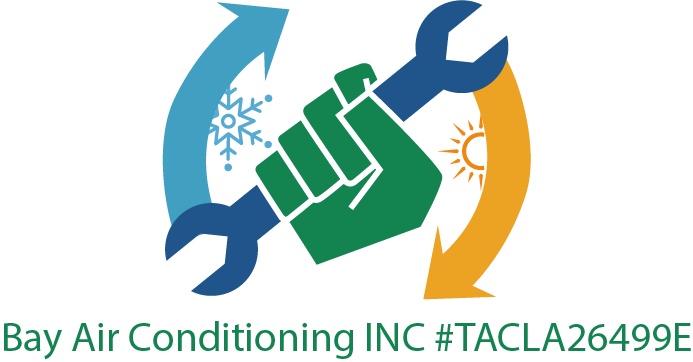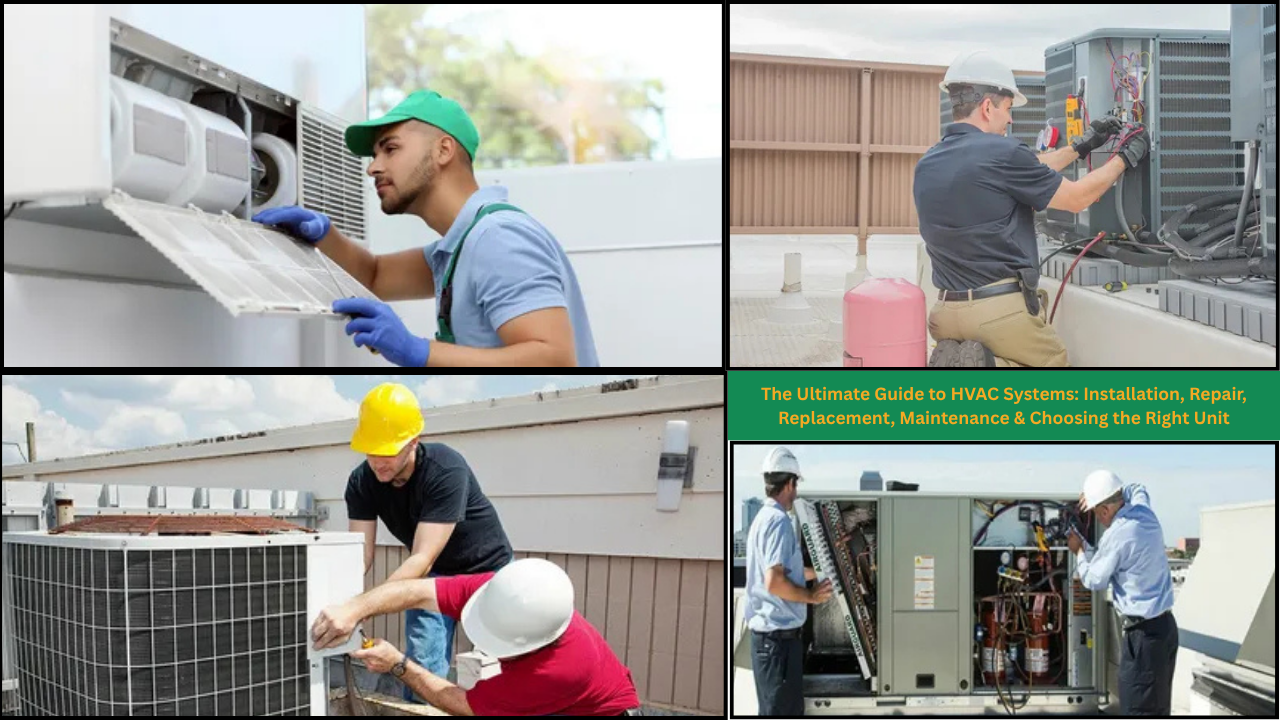The Ultimate Guide to HVAC Systems: Installation, Repair, Replacement, Maintenance & Choosing the Right Unit
Heating, Ventilation, and Air Conditioning (HVAC) systems are essential for maintaining comfort in homes and businesses year-round. Whether you’re planning to install a new HVAC system, wondering if your current unit needs repair, or trying to determine whether it’s time for a replacement, this guide is for you.
In this comprehensive article, we’ll cover:
-
Essential Guide to HVAC System Installation: What You Need to Know
-
Top Signs Your HVAC System Needs Repair: Don’t Ignore These Warning Signals
-
When to Consider HVAC Replacement: Key Factors to Evaluate
-
The Importance of Regular HVAC Maintenance for Optimal Performance
-
How to Choose the Right HVAC System for Your Home: A Comprehensive Overview
Let’s dive into each section in detail.
Essential Guide to HVAC System Installation: What You Need to Know
What is HVAC Installation?
HVAC installation involves setting up a complete climate control system in your home or commercial space. It includes ductwork (if applicable), electrical connections, thermostat setup, and the placement of indoor and outdoor units.
Factors to Consider Before Installation
-
Home Size & Layout: A proper load calculation (Manual J) should be done to ensure the HVAC system is neither too small nor too large.
-
Energy Efficiency: Choose systems with high SEER (Seasonal Energy Efficiency Ratio) or AFUE (Annual Fuel Utilization Efficiency) ratings.
-
Climate: In colder areas, you may need a more powerful furnace; in hotter areas, a high-efficiency air conditioner.
-
Ductwork Evaluation: Old, leaky, or uninsulated ducts may need to be upgraded for optimal system performance.
-
Local Codes & Permits: A licensed HVAC contractor will handle compliance with building codes and acquire necessary permits.
Professional Installation Matters
Incorrect installation can reduce system efficiency by up to 30%. That’s why choosing a reputable, licensed contractor is crucial. Improper installation may lead to:
-
Uneven heating/cooling
-
Frequent system breakdowns
-
Higher energy bills
-
Premature wear and tear
Bay Air Conditioning INC specializes in precision HVAC installations that comply with local regulations and maximize long-term performance.
Top Signs Your HVAC System Needs Repair: Don’t Ignore These Warning Signals
Catching HVAC issues early can save you thousands of dollars in repairs and extend the life of your system. Watch for these red flags:
1. Strange Noises
If you hear banging, grinding, or squealing, it could mean loose components, motor issues, or damaged fans.
2. Inconsistent Temperatures
Uneven heating or cooling can be a sign of thermostat malfunctions, duct issues, or a failing compressor.
3. Unusual Odors
Musty smells could indicate mold, while burning smells might mean electrical issues or motor failure.
4. High Energy Bills
A sudden spike in your energy bill may point to an overworked system due to clogged filters, duct leaks, or malfunctioning parts.
5. Short Cycling
If your system frequently turns on and off, it might be overheating, poorly sized, or have a failing thermostat.
6. Reduced Airflow
Weak airflow from vents can result from clogged filters, blocked ducts, or a failing blower motor.
When to Call a Technician
As soon as you notice any of these signs, contact an HVAC professional. Delaying repairs often results in more significant damage and higher costs.
When to Consider HVAC Replacement: Key Factors to Evaluate
Replacing your HVAC system is a significant investment. Here are the main factors to help you decide whether it’s time for a new unit:
1. Age of the System
-
Air conditioners: typically last 10–15 years
-
Furnaces: 15–20 years
-
Heat pumps: 10–15 years
If your unit is nearing or past these benchmarks, consider upgrading.
2. Frequent Repairs
If you’re constantly calling for HVAC repairs and costs are stacking up, a replacement may be more cost-effective in the long run.
3. High Energy Bills
Older systems are less energy-efficient. A new high-efficiency model could reduce your monthly utility costs by 20–40%.
4. Outdated Technology
Modern systems come with smart thermostats, zoning capabilities, and variable-speed motors that improve comfort and control.
5. Poor Indoor Air Quality
If you’re experiencing dust, humidity issues, or allergens, your current system may not be adequately filtering and ventilating air.
6. Incompatible with New Additions
If you’ve added square footage to your home, your current HVAC system might not be powerful enough to handle the increased demand.
Cost vs. Value
Although a new system can be expensive upfront, modern HVAC units can quickly pay for themselves through energy savings and fewer repairs.
The Importance of Regular HVAC Maintenance for Optimal Performance
Routine HVAC maintenance is the key to a long-lasting, efficient, and reliable system.
What Does HVAC Maintenance Include?
-
Changing or cleaning air filters (every 1–3 months)
-
Inspecting and cleaning coils
-
Checking refrigerant levels
-
Calibrating thermostats
-
Inspecting electrical components
-
Lubricating moving parts
-
Cleaning the condensate drain
Benefits of Regular Maintenance
-
Improved Efficiency: A clean and tuned system runs more efficiently, lowering energy consumption.
-
Extended Lifespan: Regular check-ups can add years to your HVAC system’s life.
-
Fewer Breakdowns: Minor issues are caught and addressed before they become costly problems.
-
Better Air Quality: Maintenance ensures your system is filtering dust, pollen, and allergens effectively.
-
Warranty Compliance: Many manufacturers require proof of annual maintenance to keep the warranty valid.
Seasonal Tune-Ups
-
Spring: Schedule maintenance before cooling season begins.
-
Fall: Tune up your furnace before winter hits.
Signing up for an HVAC maintenance plan ensures you never miss these critical checkups.
How to Choose the Right HVAC System for Your Home: A Comprehensive Overview
Selecting the right HVAC system involves more than just picking a brand. Here’s how to ensure the system you choose is the right fit:
Types of HVAC Systems
-
Split Systems: Separate heating and cooling units—most common in residential applications.
-
Packaged Systems: Heating and cooling combined in one unit—great for homes with limited indoor space.
-
Ductless Mini-Splits: Perfect for additions or homes without ducts.
-
Geothermal Systems: Energy-efficient and environmentally friendly, but expensive to install.
Key Considerations
-
Home Size
-
Too small: won’t heat or cool effectively.
-
Too large: will cycle on/off frequently, reducing efficiency.
-
-
Energy Efficiency
-
Look for provider certification.
-
SEER rating (for cooling): the higher, the better (e.g., 16+).
-
AFUE rating (for heating): aim for 90%+.
-
-
Zoning Needs
-
Do you need different temperatures in different rooms?
-
Zoning systems offer more control and better comfort.
-
-
Budget
-
Consider upfront cost vs. long-term energy savings.
-
Ask about financing or rebate options.
-
-
Smart Features
-
Wi-Fi thermostats
-
Remote access via smartphone
-
Energy usage reports
-
-
Noise Levels
-
Check decibel ratings.
-
Newer models are significantly quieter than older units.
-
Professional Consultation
Work with an HVAC expert to perform a load calculation, evaluate your home’s ductwork, and recommend the best system based on your specific needs.
Conclusion: Your Comfort Starts with the Right HVAC Decisions
Whether you’re installing a brand-new system, maintaining an existing one, or planning a replacement, your HVAC choices directly affect your comfort, energy bills, and indoor air quality.
Taking proactive steps to identify repair signs, scheduling regular maintenance, and choosing a system tailored to your home ensures you enjoy year-round comfort with minimal hassle.
For expert guidance, quality installations, and reliable service, trust Bay Air Conditioning INC—your local HVAC partner committed to keeping your home or business at the perfect temperature.

